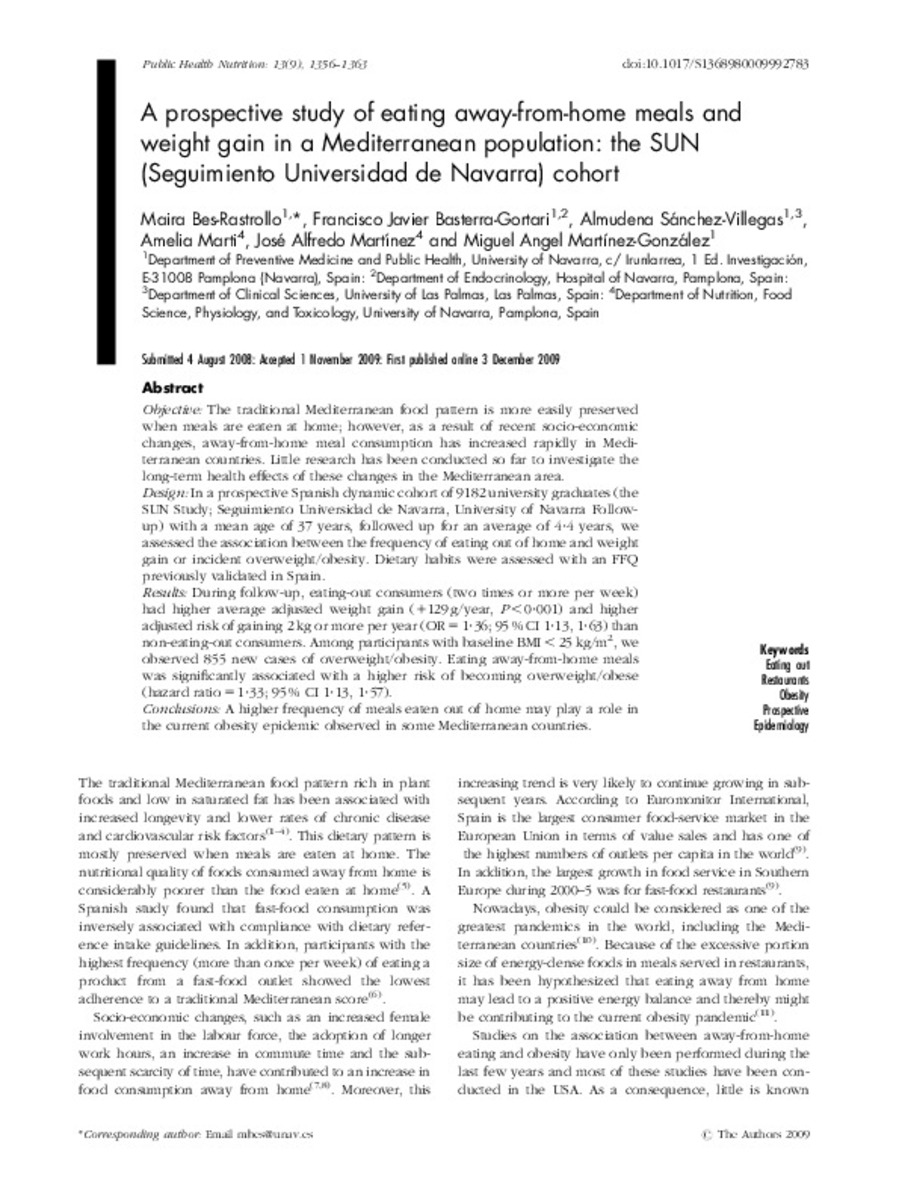Full metadata record
| DC Field | Value | Language |
|---|---|---|
| dc.creator | Bes-Rastrollo, M. (Maira) | - |
| dc.creator | Basterra-Gortari, F.J. (Francisco Javier) | - |
| dc.creator | Sanchez-Villegas, A. (Almudena) | - |
| dc.creator | Marti-del-Moral, A. (Amelia) | - |
| dc.creator | Martinez, J.A. (José Alfredo) | - |
| dc.creator | Martinez-Gonzalez, M.A. (Miguel Ángel) | - |
| dc.date.accessioned | 2012-03-17T10:07:34Z | - |
| dc.date.available | 2012-03-17T10:07:34Z | - |
| dc.date.issued | 2010 | - |
| dc.identifier.citation | Bes-Rastrollo M, Basterra-Gortari FJ, Sanchez-Villegas A, Marti A, Martinez JA, Martinez-Gonzalez MA. A prospective study of eating away-from-home meals and weight gain in a mediterranean population: The SUN (seguimiento universidad de navarra) cohort. Public Health Nutr. 2010 Sep;13(9):1356-63. | es_ES |
| dc.identifier.issn | 1368-9800 | - |
| dc.identifier.uri | https://hdl.handle.net/10171/21204 | - |
| dc.description.abstract | OBJECTIVE: The traditional Mediterranean food pattern is more easily preserved when meals are eaten at home; however, as a result of recent socio-economic changes, away-from-home meal consumption has increased rapidly in Mediterranean countries. Little research has been conducted so far to investigate the long-term health effects of these changes in the Mediterranean area. DESIGN: In a prospective Spanish dynamic cohort of 9182 university graduates (the SUN Study; Seguimiento Universidad de Navarra, University of Navarra Follow-up) with a mean age of 37 years, followed up for an average of 4.4 years, we assessed the association between the frequency of eating out of home and weight gain or incident overweight/obesity. Dietary habits were assessed with an FFQ previously validated in Spain. RESULTS: During follow-up, eating-out consumers (two times or more per week) had higher average adjusted weight gain (+129 g/year, P < 0.001) and higher adjusted risk of gaining 2 kg or more per year (OR = 1.36; 95 % CI 1.13, 1.63) than non-eating-out consumers. Among participants with baseline BMI < 25 kg/m2, we observed 855 new cases of overweight/obesity. Eating away-from-home meals was significantly associated with a higher risk of becoming overweight/obese (hazard ratio = 1.33; 95 % CI 1.13, 1.57). CONCLUSIONS: A higher frequency of meals eaten out of home may play a role in the current obesity epidemic observed in some Mediterranean countries. | es_ES |
| dc.language.iso | eng | es_ES |
| dc.publisher | Cambridge University Press | es_ES |
| dc.rights | info:eu-repo/semantics/openAccess | es_ES |
| dc.subject | Eating out | es_ES |
| dc.subject | Restaurants | es_ES |
| dc.subject | Obesity | es_ES |
| dc.subject | Prospective | es_ES |
| dc.subject | Epidemiology | es_ES |
| dc.title | A prospective study of eating away-from-home meals and weight gain in a Mediterranean population: the SUN (Seguimiento Universidad de Navarra) cohort | es_ES |
| dc.type | info:eu-repo/semantics/article | es_ES |
| dc.type.driver | info:eu-repo/semantics/article | es_ES |
| dc.identifier.doi | http://dx.doi.org/10.1017/S1368980009992783 | es_ES |
Files in This Item:
Statistics and impact
Items in Dadun are protected by copyright, with all rights reserved, unless otherwise indicated.






